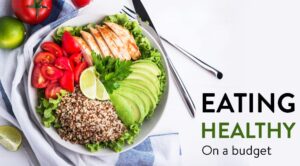Understanding Healthy Eating
Definition and Importance of Healthy Eating
Healthy eating involves choosing a variety of foods that give you the nutrients you need to maintain your health, feel good, and have energy. These nutrients include protein, carbohydrates, fat, water, vitamins, and minerals. Nutrition is important for everyone because food gives our bodies the fuel to function and grow.
Nutrients Essential for Health
Understanding the building blocks of food and how to read nutrition labels can help you make healthier choices. It’s important to focus on the quality and quantity of what you eat and drink.
Strategies for Healthy Eating
Planning Your Meals
Meal planning can be a powerful tool to help you manage your eating habits. By planning your meals, you can ensure that you have the necessary ingredients on hand to make nutritious meals throughout the week.
Choosing the Right Foods
When shopping, it’s crucial to focus on fresh produce, whole grains, and proteins. Avoiding processed foods and being cautious about the amount of sugar and salt in your diet will help you maintain a balanced diet.
Healthy Eating on a Budget

Affordable Nutritious Foods
You can eat well even on a tight budget by choosing cost-effective proteins like beans and lentils, which are both healthy and filling.
Cost-Saving Tips in the Kitchen
Learning how to store leftovers properly and making the most of your pantry staples can save money and reduce food waste.
Incorporating Variety into Your Diet
Importance of Food Diversity
A diverse diet can help you receive all necessary nutrients and enjoy your meals more. Trying new foods, especially various fruits and vegetables, can also help expand your palate.
Examples of Diverse Meals
Experimenting with global cuisines can introduce new spices and cooking techniques that enhance your dining experience without compromising on health.
The Role of Hydration in Healthy Eating

Benefits of Staying Hydrated
Water plays a key role in digestion and can significantly impact your metabolism and energy levels. Ensuring you drink enough water throughout the day can also help you feel fuller and eat less.
Tips for Incorporating More Water
If you struggle with plain water, try adding slices of fruits or herbs like mint or basil to enhance the flavor without adding sugar.
Overcoming Common Eating Challenges
Managing Cravings
Understanding the triggers for your cravings can help you make better choices. Sometimes, cravings are tied to emotions, stress, or even dehydration.
Eating Well While Busy
Preparing some nutritious snacks or meals in advance is an excellent way to ensure you don’t grab unhealthy options when pressed for time.
Healthy Eating as a Lifestyle

Sustainable Eating Habits
Integrating healthy eating into your lifestyle requires a balance of moderation and variability. Consistently choosing whole, unprocessed foods is the foundation of a sustainable eating plan.
Family and Community Involvement
Sharing meals with family and friends can make eating a joyous occasion and can help you stick to your healthy eating goals. Additionally, participating in a local garden or farmer’s market can connect you with the source of your food.
Monitoring Your Progress

Setting Realistic Goals
It’s important to set achievable health goals that encourage a gradual transition to healthy eating habits and reward milestones.
Tools and Apps for Tracking
Several apps and tools can help you monitor your dietary habits, providing insight into areas for improvement and reinforcing good behaviors.
FAQs about Healthy Eating
What are the best foods for energy?
Foods that provide a steady and reliable source of energy are essential for maintaining vitality throughout the day. Here’s a list of some of the best options:
- Whole Grains: Foods like oats, brown rice, and quinoa are rich in complex carbohydrates that your body breaks down and releases slowly, providing long-lasting energy. They also contain fiber, which helps regulate blood sugar levels to avoid spikes and crashes.
- Bananas: Known as a great source of natural sugars, bananas provide quick energy. They are also rich in potassium, which is necessary for muscle function and nerve signals that help keep you energized.
- Nuts and Seeds: Almonds, walnuts, chia seeds, and flaxseeds are not only high in healthy fats but also protein and fiber, making them an excellent energy source. They help sustain your energy levels without causing a significant increase in blood sugar.
- Eggs: Packed with protein, eggs can give you a steady and sustained source of energy because protein takes longer to break down in the body. Eggs also contain leucine, an amino acid that has been shown to stimulate energy production.
- Apples: High in fiber and natural sugars, apples provide a slow and sustained energy release. Plus, they’re rich in antioxidants that can help slow down the digestion of carbohydrates, thus releasing energy over a more extended period.
- Yogurt: This dairy product is filled with protein and is also a great source of lactose, a natural sugar that provides ready-to-use energy. Choosing yogurt with live probiotics can also aid in digestive health, which is essential for maintaining energy levels.
- Sweet Potatoes: Rich in carbohydrates and fiber, sweet potatoes provide a steady supply of energy. They are also loaded with beta-carotene and vitamins that help your body function optimally.
- Spinach and Other Leafy Greens: Spinach is high in iron, magnesium, and potassium. Iron helps your body produce energy, while magnesium plays a pivotal role in energy metabolism. Leafy greens like kale and collards are nutrient-dense and can boost your energy levels as well.
- Beans and Legumes: These are excellent sources of complex carbs, fiber, protein, and a host of minerals like iron and zinc. They help maintain stable blood sugar levels while providing sustained energy.
- Dark Chocolate: Dark chocolate has a higher content of cocoa, which contains caffeine known for its instant energy boost. It also has theobromine, a stimulant that works alongside caffeine to increase energy and provide mental clarity.
Incorporating these foods into your diet can help enhance your energy levels throughout the day, promoting overall health and well-being.
How can I eat healthy with a busy schedule?
Eating healthy with a busy schedule can seem challenging, but with the right strategies, it’s entirely manageable. Here are some practical tips to maintain a nutritious diet even when time is tight:
- Plan Ahead: Spend a little time each week planning your meals. This can be as simple as jotting down a quick menu and shopping list. Knowing what you’re going to eat ahead of time prevents last-minute unhealthy choices.
- Prep Meals in Advance: When you do have some downtime, use it to prepare meals that can be quickly assembled or reheated throughout the week. Cook batches of staples like rice, quinoa, or roasted vegetables. Portion out servings of cooked proteins like chicken or tofu for easy use.
- Utilize Healthy Snacks: Keep healthy snacks handy to curb hunger without resorting to junk food. Good options include nuts, fruits, yogurt, and whole-grain crackers. These can be easily stored at your workplace or in your car.
- Choose Smart When Eating Out: Eating out is inevitable on a busy schedule. Opt for healthier choices on the menu such as salads, grilled foods, and dishes rich in vegetables. Avoid fried items and creamy sauces which are higher in calories and fats.
- Stay Hydrated: Sometimes thirst is confused with hunger. Keeping hydrated can prevent unnecessary snacking. Water is the best choice, but other good options include herbal teas and seltzers without added sugars.
- Make Breakfast Simple but Nutritious: Start your day with a simple yet nutritious breakfast that can keep you energized throughout the morning. Overnight oats, yogurt with nuts and fruit, or whole-grain toast with avocado are quick options.
- Invest in Convenient Kitchen Tools: Tools like slow cookers, pressure cookers, and blenders can save time in the kitchen. Slow cookers allow for one-pot meals that cook while you’re at work. Pressure cookers can make meals in minutes, and blenders quickly whip up healthy smoothies.
- Learn Quick Cooking Techniques: Stir-frying or steaming vegetables and lean meats can be done in less than 30 minutes. These methods keep meal preparation times short and retain most of the nutrients in your food.
- Pack Your Lunch: Whenever possible, take a few minutes in the morning or the night before to pack a lunch. This not only saves you money but also ensures that you have control over what you’re eating.
- Limit Processed Foods: Avoid relying on highly processed foods, which can be convenient but often lack nutritional value and are filled with unhealthy additives. Instead, choose whole or minimally processed snacks and meal components.
By incorporating these tips into your routine, you can maintain a healthy diet without it taking up an inordinate amount of time, allowing you to stay focused and energized during your busy days.
What are some quick healthy breakfast options?
How do I balance calories for weight management?
Balancing calories for weight management involves understanding and managing the calories you consume and expend to achieve and maintain a healthy weight. Here are practical strategies to help you manage your calorie intake and expenditure effectively:
- Understand Your Caloric Needs: Everyone’s body requires a different amount of calories to function optimally based on age, sex, weight, height, and level of physical activity. Use an online calorie calculator to estimate your daily caloric needs based on these factors.
- Monitor Your Intake: Keep track of what you eat and drink using a food diary or an app. This can help you become more aware of your eating habits and the calories you consume. Awareness is the first step toward making necessary adjustments.
- Eat Balanced Meals: Focus on a diet rich in vegetables, fruits, whole grains, lean proteins, and healthy fats. These foods are not only nutritious but can also help you feel fuller for longer, which helps manage calorie intake.
- Control Portion Sizes: Learn to recognize standard portion sizes and use measuring cups, spoons, or a food scale to keep your portions reasonable. Eating directly from a package can lead to overeating.
- Choose Nutrient-Dense Foods: Opt for foods that provide a high amount of nutrients relative to their calorie content. Vegetables, fruits, lean meats, seafood, and legumes are excellent choices.
- Limit Added Sugars and Refined Carbs: Foods high in added sugars and refined carbohydrates are calorie-dense but low in nutritional value. Limiting them can help reduce calorie intake without sacrificing essential nutrients.
- Incorporate Physical Activity: Exercise is a crucial part of any weight management plan. It not only burns calories but also helps build muscle mass, which can boost your metabolism. Aim for at least 150 minutes of moderate aerobic activity or 75 minutes of vigorous activity each week, along with muscle-strengthening exercises on two or more days per week.
- Drink Plenty of Water: Sometimes, thirst is mistaken for hunger. Drinking water can help fill you up and prevent overeating. Additionally, staying hydrated is essential for your metabolism and overall health.
- Plan for Snacks: Choose healthy snacks like fruits, nuts, yogurt, or whole-grain crackers. Planning ahead can prevent you from reaching for unhealthy options that are high in calories.
- Be Mindful of Eating Behaviors: Pay attention to why you eat and stop eating when you’re full. Mindful eating can help you avoid unnecessary snacking or eating out of boredom or stress.
- Adjust as Needed: Weight management is not a one-size-fits-all approach. Be prepared to adjust your caloric intake and activity levels based on your weight management progress and any changes in your lifestyle or health status.
By incorporating these strategies, you can create a balanced approach to managing your calorie intake and expenditure, supporting both weight loss and maintenance in a healthy, sustainable way.
Can healthy eating help with stress?
Yes, healthy eating can significantly help with stress management. The foods you consume have a profound effect on your body’s physiological and psychological responses, particularly in how they relate to mood and stress levels. Here’s how a nutritious diet can play a crucial role in managing stress:
- Blood Sugar Stability: Consuming a balanced diet helps maintain stable blood sugar levels, which can prevent mood swings and irritability associated with sugar highs and lows. Foods rich in fiber, such as whole grains, legumes, vegetables, and fruits, slow down the absorption of sugar, helping to stabilize mood.
- Essential Nutrients: Certain nutrients play a critical role in brain health and stress reduction. For example:
- Omega-3 Fatty Acids: Found in fatty fish like salmon, flaxseeds, and walnuts, omega-3s are linked to reduced rates of depression and anxiety.
- Magnesium: Known for its calming properties, magnesium can be found in leafy greens, nuts, seeds, and whole grains. It helps manage the body’s stress response.
- Vitamin B: The B vitamins, particularly B6, B12, and folate, are crucial for nerve function and the production of neurotransmitters like serotonin and dopamine, which help regulate mood.
- Antioxidants: Stress leads to oxidative stress, which damages cells. Antioxidants help combat this effect. Foods rich in antioxidants include berries, artichokes, dark chocolate, and pecans. These nutrients can help improve your body’s ability to cope with stress.
- Probiotics: The health of your gut affects your mood and stress levels due to the gut-brain axis. Probiotics found in yogurt, kefir, and other fermented foods can improve gut health, which in turn can reduce stress and anxiety levels.
- Herbal Supplements and Teas: Certain herbs like chamomile, lavender, and green tea contain natural compounds that provide a calming effect. Regular consumption can help reduce stress and improve sleep.
- Hydration: Dehydration can cause stress, while stress can lead to dehydration. Ensuring you are well-hydrated helps mitigate stress levels and maintains optimal physiological function.
- Reducing Stimulants: Reducing intake of stimulants like caffeine and sugar, which can increase cortisol levels and exacerbate stress, is also crucial in managing stress through diet.
- Mindful Eating: Engaging in mindful eating—paying attention to the taste, texture, and pleasure of food—can enhance your enjoyment of meals and reduce stress. This practice encourages a better relationship with food and helps prevent overeating, which is often triggered by stress.
By incorporating these dietary habits, you not only nourish your body but also equip it better to handle stress. Eating a variety of nutrient-dense foods, staying hydrated, and moderating the intake of stimulants can collectively contribute to a more balanced mood and a stronger resilience against stress.
Conclusion: Embracing Healthy Eating
Adopting healthy eating habits is not about strict dietary limitations, staying unrealistically thin, or depriving yourself of the foods you love. Rather, it’s about feeling great, having more energy, improving your outlook, and stabilizing your mood.



Pingback: Healthy Aging: Advice for Maintaining Health and Vitality Through the Aging Process - knowhub
Pingback: Weight Loss Myths Debunked: Common Misconceptions About Losing Weight and Evidence-Based Approaches That Work - knowhub